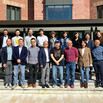Su Lin Han Holds Workshop with Peking University Law School on Government Procurement of Eldercare Services and Role of NGOs
The weakening role of family care for the elderly and a rapidly aging population have fueled growing demands for increasing public eldercare services in China. Despite the government’s commitment of substantial funding for eldercare services and its pledge to outsource more of the service delivery to private nonprofit organizations, major challenges remain in how to effectively channel public funds to nonprofit service providers by reforming the government funding mechanism and procurement process, widely seen as unfairly favoring government-operated NGOs and other government-backed entities.
Recognizing this as a opportunity to promote further nonprofit legal reform in China and open new space for NGOs to assume a greater role in social service delivery, our Center has worked with Professor Jin Jinping of the Peking University Law School to study the role of government and NGOs in funding and delivery of public eldercare services through a comparison of Chinese and U.S. laws and practices and develop policy recommendations to relevant government authorities.
On March 22, the China Law Center co-sponsored a workshop with Professor Jin’s Center on Nonprofit Organization Law to discuss the role of government and nonprofit organizations in providing public eldercare services. The Center’s Senior Fellow Su Lin Han was joined for this event by two outstanding U.S. experts: Kate McEvoy, Director of the Division of Health Services at the Connecticut Department of Social Services, and Margaret Morelli, President of Connecticut LeadingAge, a trade association of nonprofit eldercare service providers. Chinese participants included officials from the central and local government regulators in charge of procuring eldercare services, representatives from nonprofit providers of eldercare services, and prominent scholars specializing in nonprofit legal development.
Main topics discussed at the workshop included U.S. law and practices on government funding and contracting of eldercare service delivery with nonprofit organizations under Medicaid and the Older Americans Act, findings by Professor Jin and her project team of Nanjing’s experiment with nonprofit delivery of government-funded eldercare services, and legal and regulatory challenges faced by Chinese nonprofits in obtaining government approvals and in receiving fair treatment in government procurement.
Our Center plans to continue our work with Professor Jin to develop legal and policy recommendations for reforming government procurement of social service aimed at expanding the role of nonprofit participation in service delivery.


